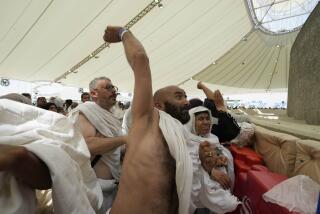Pope arrives in Jordan
- Share via
JORDAN — Pope Benedict XVI, arriving Friday in Amman on the first leg of a Middle East pilgrimage, expressed a “deep respect for the Muslim community” to King Abdullah II, who greeted him at the airport.
Benedict, who has drawn criticism in the Arab world for previous remarks about Islam, was given a red-carpet welcome in Amman. He praised the Jordanian king for “promoting a better understanding of the virtues proclaimed by Islam.”
But Benedict also hinted at one of his main concerns about Muslim nations -- the constrictions that Christians face in Middle East countries such as Saudi Arabia.
“Religious freedom is, of course, a fundamental human right,” Benedict said, “and it is my fervent hope and prayer that respect for the inalienable rights and dignity of every man and woman will come to be increasingly affirmed and defended.”
The 82-year-old pope, whose Holy Land tour also will take him to Israel and the West Bank, will have what is considered a crucial meeting today with Muslim clerics and scholars at the largest mosque in Amman, the Jordanian capital.
Here is a pair of vignettes from a Times reporter concerning other issues awaiting Benedict on his travels in Jordan and beyond:
--
A slow afternoon in Madaba
Selling a wooden Jesus has never been tougher, but Samir Haddad, a sunburned shopkeeper with dust collecting on his Virgin Mary statues, hopes that the pope’s visit will add an ecclesiastical spark to the Jordanian economy.
The papal entourage will pass Haddad’s shop today as it winds through Madaba, where pilgrims with British and Italian accents have been browsing but not buying. It’s been dismal since the global financial crisis settled in months ago and the mood turned stingy in the realm of relics, souvenirs and kitsch.
“The tourists who come have no money to spend,” said Haddad, peering through the strands of rosaries and worry beads hanging over his counter.
“Business is down 60% and now we have fears of the swine flu. Travel groups are canceling tours. We hope in the month after the pope leaves business will get better.”
Other shopkeepers felt the same. They sat on the sidewalk in plastic chairs, watching their cigarettes burn smaller. The weaver’s loom was still; no matter how pretty, no one was buying carpets of the Last Supper. Lamb spun on a spit in the kebab restaurant; the big man in the white apron shook his head.
The cops guarding St. Gregory’s listened to the “Welcome Pope” banners snap in the wind, which blew out of town and across the wheat fields.
--
On the banks of the River Jordan
It is a river of spiritual rebirth, a river of sewage and blame.
Jesus was baptized in the River Jordan. Bible stories conjure a wide, flowing river that cleanses and purifies. That’s the symbolism Amer Hafi, a religious professor at Al Bayt University in Amman, says Benedict wants to instill during his three-day trip.
The tour comes after the outrage that swept the Muslim world in 2006 when the pontiff quoted medieval writings that suggested Islam was a violent religion. What better place then to find reconciliation than the banks of the Jordan, which Benedict will visit Sunday?
“Like being baptized in the Jordan River washes your sins away, hopefully,” said Hafi, “the pope’s trip to Jordan will make the slate clean. I expect something from him to show that he understands the Arab world’s pain.”
But the River Jordan carries other symbolism too. The 150-mile river, which flows through the Lake of Galilee and into the Dead Sea, has been diverted and degraded for decades. Environmentalists blame Israel, Jordan and Syria.
“The world’s most holy river is under threat,” Israel’s Zalul Environmental Assn. said in an open letter to the pope. “Water from the once-proud Jordan River is being diverted for domestic and agricultural use, leaving the lower part of the river a shriveled stream with little to no fresh water and filled with sewage.”
But to many Jordanians, the river they once fished and swam in has been fouled by Israel alone. In the Middle East, even environmental sins are arms of politics that, like a powerful current, can suddenly shift from a river’s fate to redrawn frontiers, past wars and the plight of the Palestinians.
Writing in the independent Al Arab al Yawm, Nabil Ghaishan offered the pope advice:
“I want to remind you, while you are standing Sunday on the sacred Jordan River bank, where Jesus Christ was baptized by John the Baptist: This river has disappeared after the Israelis stopped the water from flowing into it, and its purity was replaced with waste, dirty water, which has tainted a sacred Christian symbol with shame. . . . Your Holiness, your visit to our country comes at a time when the region is burning with the fire of wars, catastrophe and oppression.”
--
More to Read
Sign up for Essential California
The most important California stories and recommendations in your inbox every morning.
You may occasionally receive promotional content from the Los Angeles Times.














